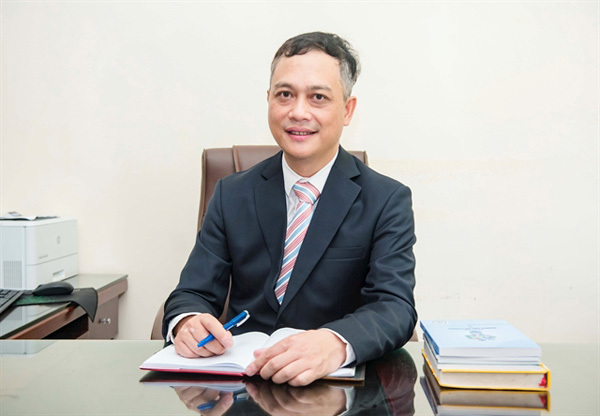- a solution to provide high quality human resources.
 |
| Assistant professor and Dr Nguyen Van Hieu. — Photo baotainguyenmoitruong.vn |
Why do you offer doctoral programmes on climate change and sustainable development?
Climate change and sustainable development are global issues whose causes, development and impacts involve in all areas of life, thus they need to be approached and analysed across boundaries. As climate change and its impacts have been developing complicatedly, we have yet to have proper preparation in terms of knowledge and human resource to respond.
Seeing a huge demand for human resource in this area in Vietnam and with accumulated experiences, our department launched doctoral programmes on climate change and sustainable development.
In the last ten years of experiences to organise programmes on interdisciplinary studies, our department has kept looking for feedback from relevant parties including State’s agencies and organisations to identify human resource demand. Although we have had master programmes which help provide human resources for key organisations/agencies like ministries of Natural Resources and Environment, Sciences and Technology, Planning and Investment, Agriculture, we still see huge demand for higher quality human resource in research and development.
The doctoral programme was developed in November, 2008 by groups of scientists in different fields such as earth science, economics, social sciences from the Vietnam National University and others. The programme was also consulted by those from world leading universities like Lisbon University (Portugal) and Ca’Foscasri Univesity (Italy). After rounds of assessments, our department officially admitted students for the programme.
What is the role of such programmes to society?
Climate change and its impacts are global challenges but require local actions, meaning that Vietnam’s response must be in global/regional context and ensure sustainable development.
Now, the number of international journals on climate change in Vietnam is relatively modest, just some about meteorology and climatology. Meanwhile, studies on climate change and sustainable development require researchers to deploy knowledge and tools in fields. Interdisciplinary studies will help increase both the amount and quality of research, and their findings could help approach realities on multi-dimensions which a specific science could not solve thoroughly.
In order to conduct interdisciplinary studies, it is needed to prepare a force of scientists with knowledge, approaching ways, analysis as well as ability to find and solve problems interdisciplinary.
In addition, nowadays, people with PhD not only participate in doing research and public scientific works but also managerial positions in agencies, development projects or start-ups.
How do you do to attract students to doctoral courses on climate change and sustainable development?
We have set up a network of more than 400 scientists and experts thanks to our programme for a master’s degree. We also have a flexible mechanism to mobilise more than 2,000 high quality researchers who work for the Vietnam National University. These are the advantages that few doctoral programme in Vietnam offer.
We also have a flexible, simple and direct management system including experienced scientists who consult and are responsible for training curriculum and student management.
The centre for Sciences, Technology and Support offers an environment for post-graduates and lecturers to attend scientific events like regular seminars.
We also plan to form research teams for post-graduates so they will have opportunities to work and produce scientific results. Moreover, they could access and use modern labs.
Besides internal assistances, we have looked for co-operation opportunities with overseas research institutions so postgraduates will be able join projects which expectedly help increase quality of studies, their application ability in reality and ensure funding for researchers.
Engaging postgraduates in study projects is a trend that many universities all over the world are applying.
What other factors do you think contribute to the success of the doctoral programmes?
I think local authorities’ support and postgraduates' active participations in scientific co-operations are key contributors to the success of the programme.
In addition to studying and doing research, postgraduates also join other activities including seminars, workshops, tutoring to parts of the programme as well as field trips. Those who attend the doctoral programmes are also encouraged to find and suggest topics, projects or scientific work they want to join. When joining in developing scientific projects, postgraduates could improve their ability and earn money as well. VNS

Developing human resources for meteorology industry
Professor Tran Hong Thai, general director of Vietnam’s General Department of Meteorology, talks about the improvements of Vietnam's meteorology industry

Accelerate implementation of UN Sustainable Development Goals
Vietnam's Human Development Index (HDI) in 2017 was 0.694, belonging to the high average group of the total 189 countries.
 Head of the Interdisciplinary Department under Vietnam National University Hanoi, Assistant professor Dr Nguyen Van Hieu talks about doctoral programmes on climate change and sustainable development" itemprop="description" />
Head of the Interdisciplinary Department under Vietnam National University Hanoi, Assistant professor Dr Nguyen Van Hieu talks about doctoral programmes on climate change and sustainable development" itemprop="description" />